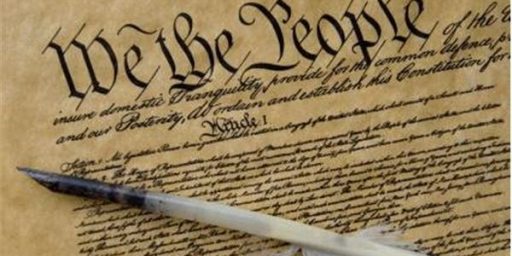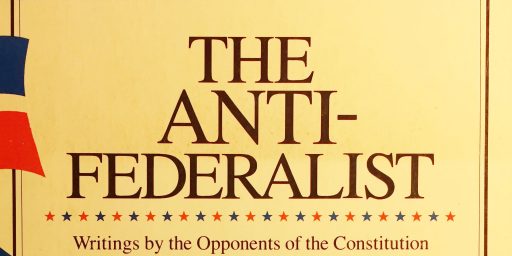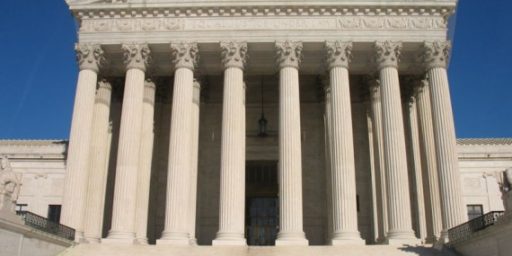Our Living Constitution
Dave Schuler looks at several constitutional amendments that were considered by Congress in the wake of the War of 1812 and is astonished to find that, while they didn’t go through, each and every one of them has long since become unquestioned powers of the Federal Government.
It was obvious to these men, well within living memory of the writing of the Constitution that the Congress did not already have these powers, but in a little more than a hundred years an outlaw Supreme Court would decide that Congress had had these powers all along.
Quite right. Essentially, we moved from the view that the central government had only those powers expressly delegated by the Constitution to one where the government could do anything not specifically prohibited in the Constitution to one where only the “most fundamental” Constitutional provisions were binding.






There’s quite another explanation for the proposed amendments: there was a controversy over what was permissible. Remember, that Alexander Hamilton had already established a national bank by this time. That controversy ended up at the Sup. Ct. in 1819 in McCulloch v. Maryland. One would assume that Chief Justice Marshall was also familiar with the arguments surrounding the adoption of the Constitution. The likely explanation is that those amendments were introduced by the Federalists to try to have their views carry the day. There is no question that the Hamiltonians’ views have prevailed.
Or we could just not care because we don’t live in 1812. We don’t have any use for the scientific theories of that day, their social mores, or their political ideology.
Time, as they say, marches on.
The Constitution is just a way for the evildoers to justify their acts of terror. We need to abolish it immediately and hand all power to a unitary executive.
Really the notion that there was ever a period where the Constitution was adhered to absolutely is simply not true. See, for example, the Louisiana Purchase of 1803.
And, indeed, as Steven Donegal noted above, there wasn’t a monolithic view of how the document should be applied even in the earliest days of the Republic. Indeed, the only constant over time has been that different political factions/parties have, from the beginning, argued about exactly what the Constitution means.
I didn’t claim that there was, Steven.
However, IIRC Jefferson himself didn’t believe that he had the power to purchase the territory of Louisiana and proposed a constitutional amendment to remedy the situation. I’ll see what I can dig up on it.
Again my point is not that there was some mythically pure time but that the issue of government by limited powers was once taken much more seriously than it later was.
I am actually sympathetic to your general argument. However, I have also given this issue some thought of late and have come to conclusion that we often look back with substantial nostalgia on the way things used to be. We also think that a strict interpretation is easier than it may actually be.
And my point about the Purchase was precisely that Jefferson did doubt that he had the constitutional authority to act as he did, and yet he did act.
Tlaloc, are you trolling? I expect that from Triumph now (though he sometimes posts seriously, always throwing me off), but not from you.
Indeed. My take on that is that, like all successful revolutionaries, Jefferson was a pragmatist rather than a theorist. He had a hierarchy of values, survival of the Republic came nearer the top than a slavish devotion to the strict letter of the Constitution, and he saw the purchase of Louisiana as necessary to the survival of the Republic.
That there was a slippery slope in that is now pretty obvious. It’s a challenge in system of the rule of law to allow for dealing with exigent circumstances without institutionalizing the occasional violations of fundamental principles.
Jefferson actually only wanted New Orleans, Napoleon surprised him by offering all of the Louisiana territory.
Arguments over the interpretation of the constitution were going on before the ink was dry. There was never a universal understanding of the constitution and there was disagreement among those who wrote it, which is why there were federalists and anti-federalists.
Geez if you really want to go with a strict interpretation then you have to be prepared to disband our standing army and give up the legal fiction of corporate person-hood. Until you are ready to do those things I’m not at all prepared to take seriously any arguments about activist judges, original intent or any of the other brands of (almost always) self-serving ideological sophistry that passes for constitutional debate these days.
Not at all. My argument was completely serious.
Why would we care about the political interpretations from TWO HUNDRED YEARS ago? What possible bearing do they have today?
Unless you want to ascribe to the founding fathers some mystical infallibility (which requires a total illiteracy of what they actually did) then it makes no sense to base our current practices on a time period that is completely divorced from our modern age.
The founding fathers were pretty bright. They had a big task and they did a good job given the circumstances. They were not the end all and be all of knowledge. Frankly the most pedestrian american today knows far more about how the world works than they did simply because the volume of human knowledge has doubled so many times since then. The FF lived in a very different world, a world before the computer revolution, the communications revolution, even before the industrial revolution really got going.
It was a totally different time. America was not a superpower by any means. So again- why would anyone assume that the political ideas of the time would have bearing on modern life?
The principles of democratic rule are thousands of years old. We don’t adhere to everything the same, but we build on the past, we don’t dump it.
Ok, go out on the street today and ask a total stranger who the President of France is. The total volume of human knowledge may have doubled (more I would expect), but the pedestrian knowledge of anything outside of the US A has diminished to almost nothing.
Our democracy shares only a name with the athenian democracy. The most basic underlying concept is the same, EVERYTHING else is different. We most certainly have dumped the past, and with very good reason.
Our biggest problems today tend to stem from places where we are trying to preserve the past despite how inappropriate it is.
Look at the manner in which we keep our president and congressmen. It is virtually identical to how aristocratic societies kept their nobles. We abandoned much of the ideology of the aristocratic societies of our past but inappropriately kept some elements.
No wonder our supposedly equal society still has such terrible inequality! Our “first among equal” citizens are not treated as equals at all, but as superiors. There is no good reason that the whitehouse maintains a four star chef who does nothing but make pastries for instance. There is no reason for a republic to pay for such luxury perks for an elected president.
Just an example of how the influence of the past can and should be regularly dumped. As Jefferson said, “a little revolution now and then is a good thing.”
(This does not mean forgetting the past, by any mean, it merely means not being bound to the past simply because it was the past.)
Ask Benjamin Franklin to locate mongolia on a map, or to explain the working of a internal combustion engine, to weight the merits of laser versus magnetic storage media, or to discuss the big bang. For that matter ask him about either world war, the failing of National Socialism, and the benefits of a space program.
Look I have no illusions that the average american is well read or terribly knowledgable about the world around them but it’s a simple matter of perentages. Even if Ben Franklin was well read on 50% of the total knowledge of his day and the typical modern american is wll read on half a percent they still blow Franklin out of the water. Easily. The field of human knowledge has expanded so radically that our lives would be regarded as the wildest science fiction by someone a mere hundred years ago, much less two hundred years ago.
I have to agree with Tlaloc here. The word “democracy” is thousands of years old, but the Greek and Roman understanding of the concept simply does not comport with our own.
Modern representative democracy is relatively new in terms of human history, and even our understanding of it now is substantially different from the founding of the US.
Just the basic issue of suffrage has radically changed since 1787 (or 1812) or even the early 20th Century. And that question of who has the right to vote is a rather fundamental one to democratic governance.
And Dave: I am sure that pegging Jefferson (or revolutionaries in general) as a pragmatist. He was quite the idealist–but there is something about being seated at the President’s desk that brought out pragmatic impulses. But this simply underscores my point: even prior to the war of 1812, it was hardly the case that US politicians saw the Constitution as a sacrosanct document which so limited their behavior that they had to adhere to its strict letter.
In other words: stretching the meaning of the words on the pages is not a modern phenomenon. The National Bank issue also cited above underscores this as well.
Heavens, the vaunted duo of Madison and Hamilton, authors of most of the Federalist Papers did not ultimately share the same interpretations of the document.
You’ll have to explain that for me, I don’t see aristocracy in modern US politics. Power and all it’s usually trappings sure, but not aristocracy.
Our social equality is an equality of opportunity, not an equality of success. It may not be perfect, but we do our best to provide equal opportunity to all.
A little revolution doesn’t need to dump the old way of doing things, the new US government was very much like the old Colonial government in terms of how things ran, it was mainly a different of who ran it. We have that kind of “little revolution” every 2-4 years or so.
Apples and Oranges, Franklin, not matter how smart, could not have known about things either not discovered or not created yet. The head of state of France, however, is something people then and now are capable of knowing. I’d be willing to bet that Franklin could explain the internal combustion engine, but go ahead and ask your modern pedestrian about Mongolia, magnetic storage or the big bang and see how far you get.
Try this- look at a formal US state dinner. Now look at a formal dinner for the Queen of England. Notice a difference? Neither do I.
“Power and all it’s usual trappings.” What defines the usual trappings? For us, coming from the feudal western background, it is defined by the trappings associated with nobility.
We do have little revolutions, which is why our government is as stable as it is. but at the same time, these little revolutions always miss things. Parts of the government get out of control, out of whack, and don’t get corrected the way they would if we scrapped everything and started over.
What I’m saying is the government needs a high colonic, basically 🙂
Of course not, but go back to what I said, the average american today knows more about how the world works than franklin could hope to. Not because Franklin was stupid but because he lived in a time that was vastly ignorant by comparison.
Of course it’s not a fair comparison, I said so from the beginning, people today have a huge and unfair advantage. But by that same principle we should not revere our ancestors who were uniformly ignorant savages by comparison. We can compliment tham by saying “they did the best they could with what they had,” and in the future our descendents will say the same of us. Hopefully.
Again I disagree, especially when it comes to governance and foreign policies, there is not a great deal more knowledge available now than in Franklin’s time, and certainly pedestrian knowledge is no better now than then, I would even guess it is worse. Despite not having computers and airplanes, our ancestors were not ignorant savages my any comparison. More politicians in 1776 believed in science than do now, for one example.
Have you by chance read about the conditions on those ships which supplied the slaves to the american colonies? Perhaps you’re familiar with child labor in the colonies? Women’s rights, which consisted mostly of the “right” to be property? Now tell me again how the people who supported such practices weren’t ignorant savages…
They did believe in the science of their time, but they were also deists by and large which made it easier for them.